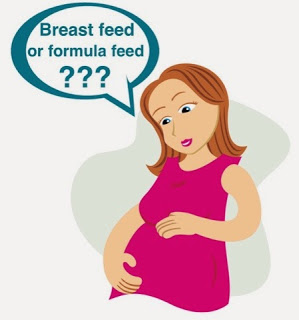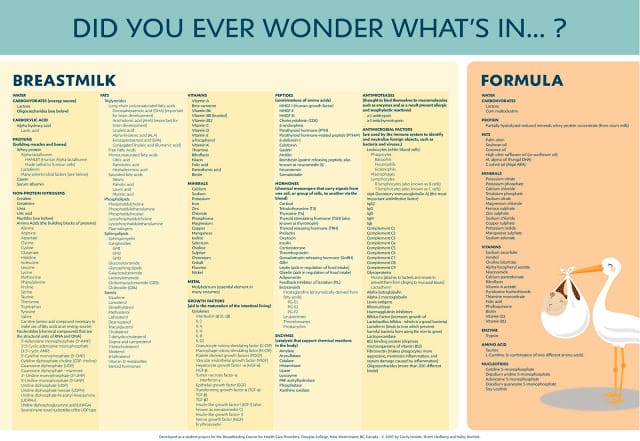I am an IBCLC (International Board Certified Lactation Consultant) in private practice in Northern Ireland and a La Leche League Leader with La Leche League of Ireland
Why Breastfeed? Isn't Formula much the same nowadays?
Well, why are you considering it? While pregnant, we probably all have our own individual reasons for thinking about breastfeeding. For me the reasons I wanted to breastfeed was that I knew it was "better for baby" and it was natural (being from a generation that has been brought up being told we need to think about the resources of our environment, this was a big factor).
The last UK Infant Feeding Survey shows that like me, most pregnant women who intended to breastfeed, said that the reason was for "baby's health". Most women were also able to name a health reason. This isn't overly surprising given that most antenatal information lists conditions associated with formula feeding. I don't want to list a lot of health information and conditions in this blog. They are well known and well documented. We live in a culture where the majority of people were and are formula fed, and to be honest, I feel that listing health issues doesn't really help women get through the first few days and weeks of breastfeeding (particularly when we see most of those formula fed people living full productive lives). If you do want to read more about these health conditions there is a good information leaflet here and a link to the NHS breastfeeding site.
Aren't Breast milk and formula much the same nowadays?
You may be hearing that from others. After all, we hear a lot in the media about the years of research that has gone into formula and how it is closer than ever to Breast milk. Certainly formula has come a long way since the early 20th century, when infant mortality for children not fed at the breast was unthinkably high. A history of infant feeding can be found here.

Today formula milk is still based on cows milk, and has a mandated list of vitamins and minerals which must be added. The list is based on vitamins and minerals which are in human milk, however they are not in the same quantities as human milk. The improvement in manufacturing processes has also made a difference and in developed countries with a clean water supply, most babies now can have infant formula as their sole food source without the devestating infant mortality rate of the past. That doesn't mean the difference is negligible though.
As research into human milk continues, new ingredients continue to be added to infant formula, but there is still a very long way to go, and they are definitely not "much the same".
This poster has a good visual comparison.

This doesn't list all breastmilk components, as more are being found on a regular basis, as research continues.
So if not health benefits, then Why?
Breastfeeding is a continuation of pregnancy. Human babies are extremely immature at birth. Most mammals are capable of moving around independently of their mother at birth. Even dogs and cats, although very immature when born, are able to see and explore their environments within a few days. Human babies however, are not. They cannot walk until sometime around the end of the first year, or into the 2nd year.
Crawling only happens in the 2nd half of the first year. Babies have fairly basic reflexes for survival at birth and very rapid brain development happens in the early weeks and months after birth. This is out of necessity, as we would not be able to birth our babies if their brains were any larger.
This has led to many articles describing a 4th trimester that babies undergo, or how they have a period of gestation after birth, and are designed to be held in our arms or on our body during this time. The relevance of this is two-fold: Firstly it explains a lot of normal baby behaviour which is commonly mistaken for a breastfeeding problem in the early weeks (which will be covered in future blogs); Secondly, it leads us into a discussion of how breastfeeding continues the development of our babies.
Just as an incubator can provide a stable environment for a premature baby to grow but cannot replicate the development that baby would have had in your womb, infant formula cannot complete all the work that began inside your body.
Human milk guides the development of the immune system, it provides growth factors, metabolic hormones and stem cells which persist in the organs throughout that baby's life. Something is going on within breastmilk to guide the continuing development of the baby. Your milk is unique. It is designed for your baby, and not other. In the same way that your body guides the development of your baby in your womb from a single cell to a newborn, so your body continues to guide your baby's development for as long as you choose to breastfeed.

Even if weren't for all that - even if there were nothing in breast milk, it would still be worth doing. Breastfeeding is biologically programmed in us. Once we give birth we produce milk, regardless of how we intended to feed that baby. Likewise, when a baby is born he is hard wired to seek out the breast and latch. It just feels right- to both you and your baby There is something indescribably beautiful about feeding your own baby, which only makes sense when you look down and see your baby at your breast. Isn't that as good a reason as any!
If you have any questions about a consultation or would like to arrange to meet, please get in touch.
Important Information
All material on this website is provided for educational purposes only. Online information cannot replace an in-person consultation with a qualified, independent International Board Certified Lactation Consultant (IBCLC) or your health care provider. If you are concerned about your health, or that of your child, consult with your health care provider regarding the advisability of any opinions or recommendations with respect to your individual situation.
